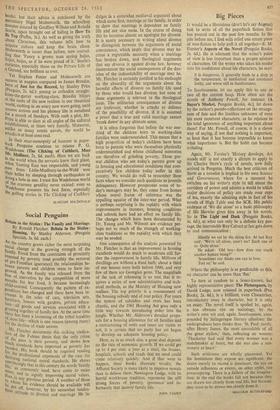• Social Penguins
As the country grows richer the most surprising social change is the growing strength of the family. Freed from the constraints of proximity unposed by poverty (and possibly the removal of pre-Freudian ignorance) the relationships be- tween parents and children seem to have iln- Proved. As the family was released from the fear of starvation by the competition of more mouths for less food, it became increasingly child-centred. Consequently the pattern of ex- penditure has changed and there have been in- creases in the sales of cars, television sets, furniture, houses with gardens, private educa- tion—all goods and services associated with a growing together of family ties. At the same time there has been a loosening of the tribal loyalties of slum life—which is one reason (among many) tor the decline of trade unions. `Mr. Fletcher documents this striking vindica- Tit of the Fabian thesis that the only crime of the poor is their poverty, and shows how much standards have improved as poverty has tiec°1:edfd. His book should be required reading _, hie professional exponents of the case for eclining national moral standards. He shows life' as that in this century the words 'family - e' as commonly used, have come to mean re, and to signify improving moral values, t_ab in any previous period. A number of those whom his evidence should be available will "its put off, however, by his somewhat tenden- attitude to divorce and marriage. He in- dulges in a somewhat medimval argument about which came first, marriage or the family, in order to show that marriage is dependent on family life and not vice versa. In the course of doing this he becomes almost an apologist for divorce. It is surely necessary in writing about divorce to distinguish between the arguments of social convenience, which imply that divorce may be- come a regrettable necessity when a marriage has broken down, and theological arguments that say divorce is against divine law, however inconvenient the social consequences of the doc- trine of the indissolubility of marriage may be. Mr. Fletcher is certainly justified in his onslaught on the absurdity of the arguments about the harmful effects of divorce on family life used by those who would ban divorce; but none of these arguments, is relevant to the theological issue. The utilitarian consequences of divorce are irrelevant, whether in attacks or defence of the possibility of divorce, if it is assumed a priori that a true and valid marriage cannot 'break down' in any ultimate sense.
It is often forgotten that before the war one- third of the children born to working-class families were undernourished. This means that a high proportion of today's children have been born to parents who were themselves physically undernourished and whose childhood memories are therefore of grinding poverty. These pre- war children who are today's parents grew up in housing and educational conditions that com- paratively few children today suffer in this country. We would do well to remember these facts when we consider such questions as juvenile delinquency. However prosperous some of to- day's teenagers may be, they come from homes whose moral frame of reference was the appalling squalor of the inter-war period. What is perhaps surprising is the rapidity with which improvements in incomes, housing conditions and schools have had an effect on family life. The changes which have been documented by Dr. Young and Mr. Wilmott are evidence per- haps Fletcher psneottseor is that much an improvement of the strength in negthofwhonruksiningg- class traditions as the rapidity with which they may be eroded. One consequence of the analysis presented by Mr. standards would do much to accelerate still fur- ther the improvement in family life. Millions of dwellings are without a fixed bath; about a third of our houses were built before 1900, and very few of them are Georgian gems. The magnitude of the task of rehousing is so vast that it re- quires a series of new administrative and tech- nical methods, as the Ministry of Housing now realises. The top priority is a reassessment of the housing subsidy and of rent policy. For years the system of subsidies and rents has been chaotic, and the 1961 Housing Act goes only a little way towards introducing order into the jungle. Whether Mr. Alderson's detailed propo- sals for a housing allowance for all families and a restructuring of rents and taxes are viable or not, it is certain that no party has yet begun to develop an adequate housing policy.
Here, as in so much else, a great deal depends on the rate of economic growth. If we could get up to 4 per cent. a year as a start, the houses, hospitals, schools and roads that we need could come relatively quickly. And if that were to happen, these books illustrate vividly, the Affluent Society is more likely to improve morals than to debase them. Newington Lodge, with its horrid workhouse tradition, represents the still strong forces of poverty, ignorance and in- humanity that destroy family life.
JOHN VAIZEY














































 Previous page
Previous page